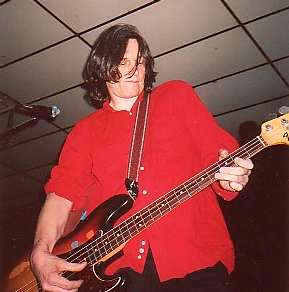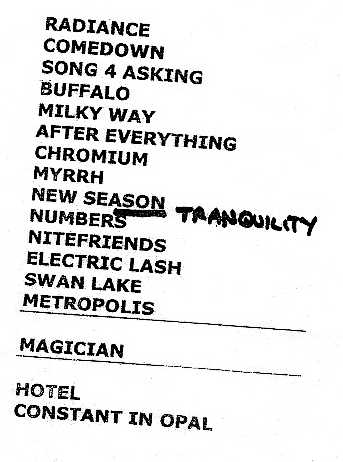| How do you recreate the ambience, mystery, and allure of your past couple albums, when you seemingly rely on the dense, atmospheric aura plied from studio gadgets and mixing boards? Well, if you're The Church's Steve Kilbey, you close your eyes and it just comes naturally, if not by magic. One of only a handful of bands who've been around for over 20 plus years and aren't on a turn-of-the-millenium nostalgia trip, The Church are more of a band than ever before. |
 Marty tries to wave down a bull.
Marty tries to wave down a bull.
Photo by sfenn. |
| |
Drummer Tim Powles came along just in time to pull Kilbey and guitarist Marty Willson-Piper out of their twin orbit and into a nucleus with four disparate yet obviously complementary personalities. Kilbey, of course, is in his own place, and judging by the tranquil glaze across his face, it's a good place. 'Radiance', 'Song for the Asking' and 'Buffalo' each put us there too. But we keep our eyes open, because we don't want to miss any of Marty's grandstanding, as he jeers, kicks and even pulls faces like DeNiro when he takes over lead vocals for 'Chromium'. |
| Guitarist Peter Koppes is no second fiddle either. While Marty's antics make him the focal point--the lead guitarist you might think--Koppes is quietly and handily fleshing out the sound. It's no mere rhythm guitar he's playing: he adds the warmth, depth, and texture that ultimately give the performance "The Church sound". (Stick in the Koppes-less Sometime Anywhere and you'll hear the difference.) Then when Peter takes the mic for 'New Season', you remember that he's had a solo career of his own, while never making headlines, made ample waves with those in the know. Powles is the steady lifeforce, the glue that holds together wispy and ethereal numbers like 'Night Friends' and 'Swan Lake' as well as the rearranged rockers 'Electric Lash' and the show-ending 'Constant in Opal' unearthed from deep within their catalogue. Even pianist David Lane, who contributed to a handful of tracks on After Everything Now This, is a perfect fit, looking like a younger version of The Church themselves circa Heyday or Starfish. Treasures like 'Myrrh' and 'Comedown' left the audience shaking its head in wonder, awe and agreement. Song requests were simply unnecessary; they could have hardly assembled a better set. |
 |
The indulgent and trippy 'Magician Among the Spirits' and Kilbey's prosaic and expository introduction of the band subbed in for the kind of tedious solo-laden encore that a lesser band would have fooled themselves into thinking we wanted to hear. And we would have even been alright without the requisite and much appreciated 'Under the Milky Way'. Someone somewhere in the world is making better music than this right now, but we'll most likely never hear it.
-sfenn/may 2002 |
|

